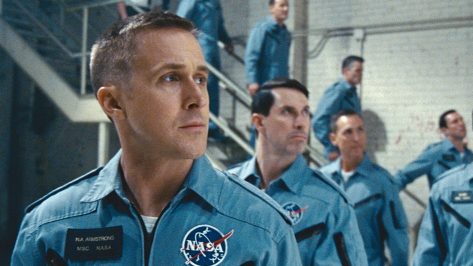
Stoicism is not entertaining. Watching a man quietly endure pain from the deaths of his young daughter and several of his colleagues does not make for a feel-good movie. Yet that’s what you get from Damien Chazelle’s “First Man,” a biopic about Neil Armstrong, the first human to walk on the moon, played by Ryan Gosling.
The two best movies about NASA’s achievements are “The Right Stuff” and “Apollo 13,” both breathtaking in their visuals, with based-on-truth stories that are masterfully told. “First Man” contains some of that, but a lot more scenes of Armstrong’s struggle to hold things together on the domestic front with wife Janet (Claire Foy) and their children. Meanwhile, at work, Armstrong is portrayed as a man who rarely speaks, even with his fellow astronauts, about their enormous undertaking.
Long before the historic Apollo 11 voyage to the lunar surface, Chazelle shows us Armstrong as a pilot maneuvering various aircraft, going through training, and testing a mockup of the Lunar Excursion Module. We see him saving Gemini 8 from becoming a deathly disaster when a malfunction caused it to spin wildly while docked with another craft in space. Because there’s so little dialogue, even in the debriefings after each mission, we are forced to extrapolate what’s going on, as if our job as viewers is to decipher what’s happening inside Armstrong’s head. These were exciting events that didn’t always go as planned, but watching Gosling as Armstrong, you’d never know a good day from a bad day.
Throughout “First Man,” Chazelle opts for the internal rather than the external — what’s going on in an astronaut’s head as well as in the confined spaces they traveled in. He uses a tremendous amount of shaky camera work to portray speed and turbulence, both major factors in spaceflight. Philip Kaufman used some of that in “The Right Stuff,” particularly in the early scene where Chuck Yaeger is breaking the sound barrier in the X-1, but Chazelle relies on it too much and with too little context. He dazzled me with his visual acuity in “La La Land” and “Whiplash,” yet he tries too hard to be fancy with much of what’s on the screen in “First Man.”
Chazelle also gives short shrift to the other two men on the Apollo 11 crew, Buzz Aldrin (who also descended to the lunar surface) and Michael Collins (who remained in orbit in the command module and never set foot on the moon). Based on “First Man,” you’d think those three men spent eight days in space together without saying more than a half-dozen sentences to each other. Gosling’s Armstrong is more akin to his character in the overrated “Drive” — intensely silent, for the most part.
Foy, meanwhile, is excellent as Janet Armstrong, the glue that kept her family together while worrying every day that the husband and father who left for work each morning might not come home that night. The rest of the supporting cast at NASA includes Jason Clarke as Ed White, Corey Stoll as Aldrin, Kyle Chandler as Deke Slayton, Ciarin Hinds as Gene Kranz, Ethan Embry as Pete Conrad, Patrick Fugit as Elliott See, Shea Whigham as Gus Grissom, Lukas Haas as Michael Collins, and Brian d’Arcy James as Joe Walker. They are all solid, particularly Clarke.
Somehow, Chazelle has taken the greatest scientific achievement in human history and turned it into a story with no climax, no personality, and no celebration. I don’t know much about the fortitude Neil Armstrong displayed throughout his life, but I do know that grief and forbearance and marital discord were not the ingredients I hoped to see in a movie about him and that great adventure.
I give “First Man” a 4 out of 10.
P.S. One point I must raise has to do with the right-wing loudmouths who — without having seen the movie — claimed to be upset that “First Man” doesn’t show Armstrong planting the American flag on the moon. It’s completely bogus, because while there’s no scene of Gosling sticking the flagpole in the lunar soil, you can clearly see the Stars and Stripes up there in at least a couple of shots. There are also plenty of scenes in which people at NASA are upset that the USSR kept beating the US to various milestones (e.g. Sputnik, Yuri Gagarin, the first space walk) and rightly proud when it was the other way around (e.g. the first docking of two vessels in space, and the only nation to land humans on the moon and return them safely to Earth). Those loudmouths have even less credibility than those who deny we went to the moon in the first place.
